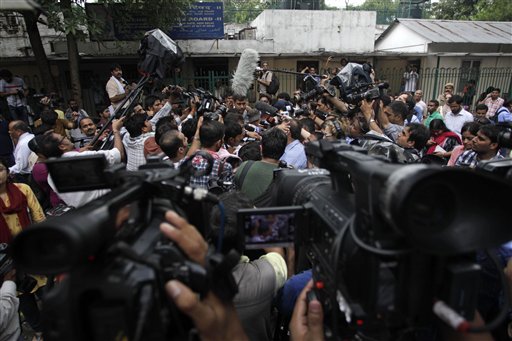
Media personnel gather around defense lawyer Rajesh Tiwari, unseen, for the fatal gang rape of a young woman on a New Delhi bus outside a juvenile court in New Delhi, India in this July 25 file photo. AP
NEW DELHI—An Indian juvenile court convicted a teenager of rape and murder Saturday in the first conviction stemming from the December gang rape of a young woman on a moving New Delhi bus.
The defendant, who was 17 at the time of the attack, has been sentenced to three years in a reform home, the maximum sentence he could have faced, his lawyer Rajesh Tewari said. Indian law forbids the publication of his name, though he has since turned 18.
The attack, which left the victim with such extensive internal injuries that she died two weeks later, sparked protests across the country and led to reforms of India’s antiquated sexual violence laws. The government, facing immense public pressure, had promised swift justice in the case.
The convicted defendant was one of six people accused of tricking a 23-year-old woman and her male companion into boarding an off-duty bus December 16 after they had seen an afternoon showing of “Life of Pi” at a upscale shopping mall. Police say the men raped the woman and used a metal bar to inflict massive internal injuries to her. They also beat her male companion. The victims were dumped naked on the roadside, and the woman died from her injuries in a Singapore hospital.
Four of the other defendants are being tried in a special fast-track court in New Delhi and face the death penalty. The sixth accused was found dead in his jail cell in March. The court is expected to hand down the rest of the verdicts next month.
The convicted defendant was tried as a minor on charges including murder and rape. The time he spent in a juvenile home since he was arrested in December will count as part of his three-year sentence, Tewari said.
The attack set off furious protests across India about the treatment of women in the country and led to an overhaul of sexual assault laws.
The victim’s family called for the teenager to be tried as an adult, accusing him of being the most violent of the attackers.
“He should be hanged irrespective of whether he is a juvenile or not. He should be punished for what he did to my daughter,” Asha Devi, the mother of the victim, said soon after the verdict was announced.
A government panel set to suggest reforms to sexual assault laws rejected calls to lower the age at which people can be tried as adults from 18 to 16.
On July 17, India’s top court also refused to reduce the age of a juvenile from 18 to 16 years. However, it later agreed to hear a new petition seeking to take the “mental and intellectual maturity” of the defendant into account and not just age.